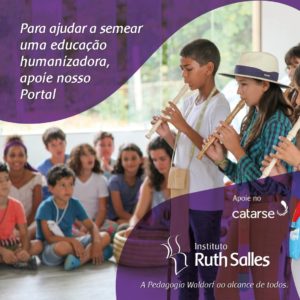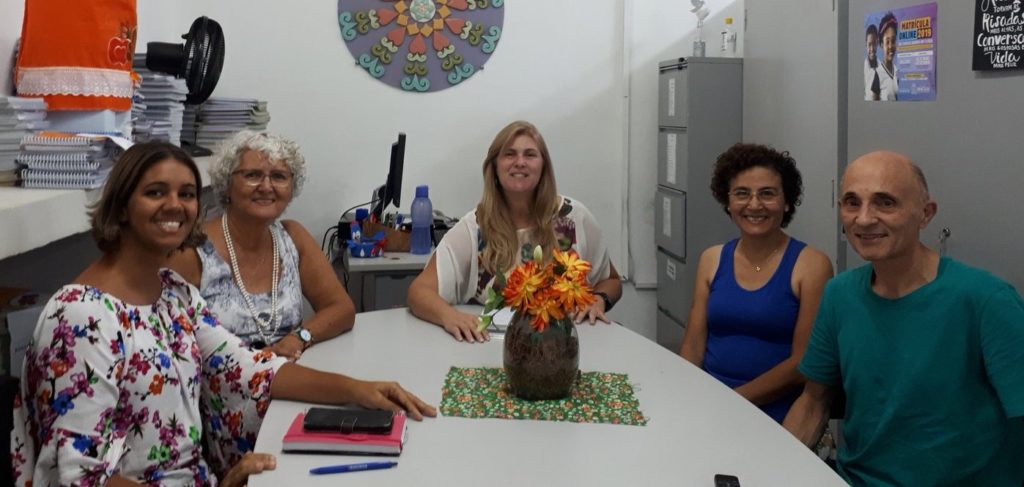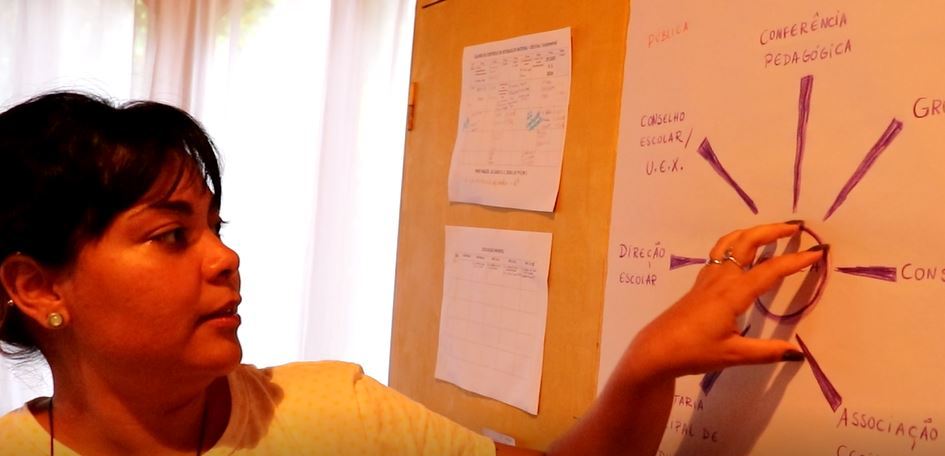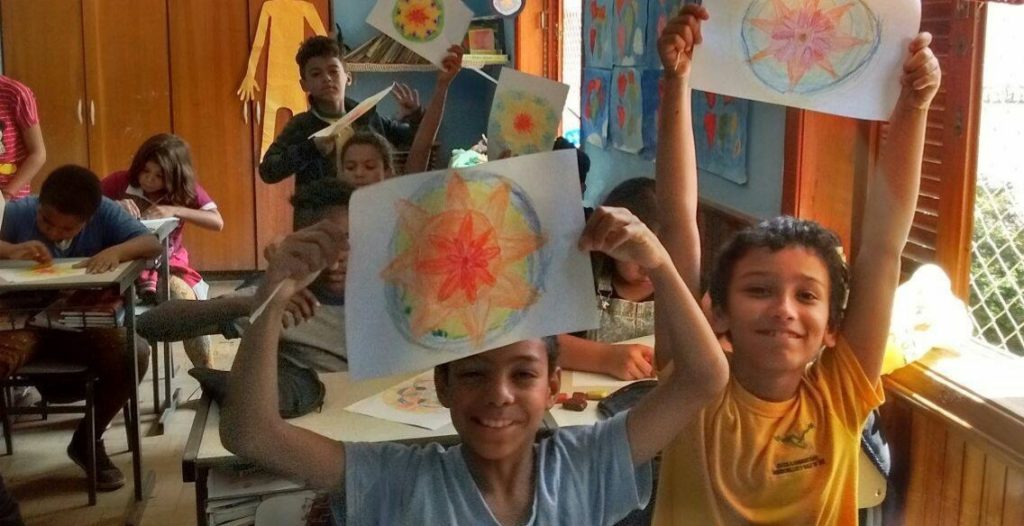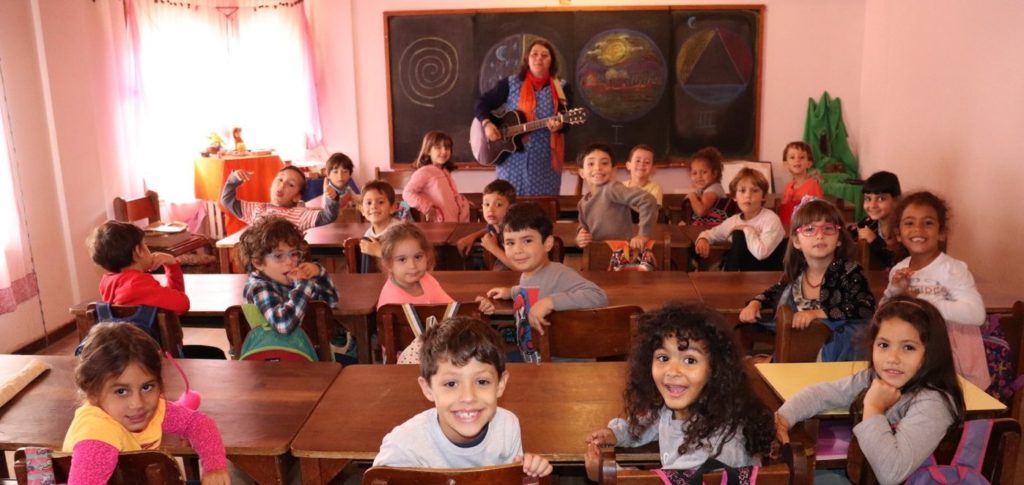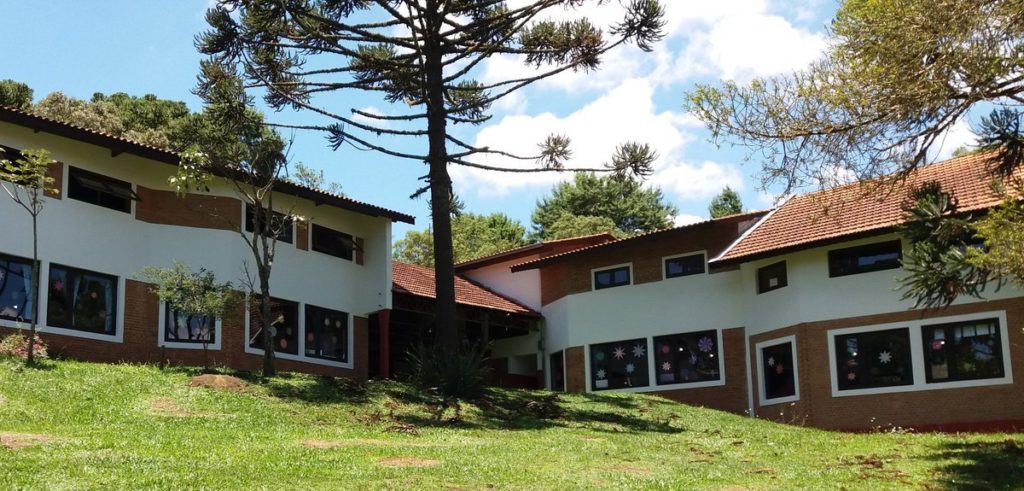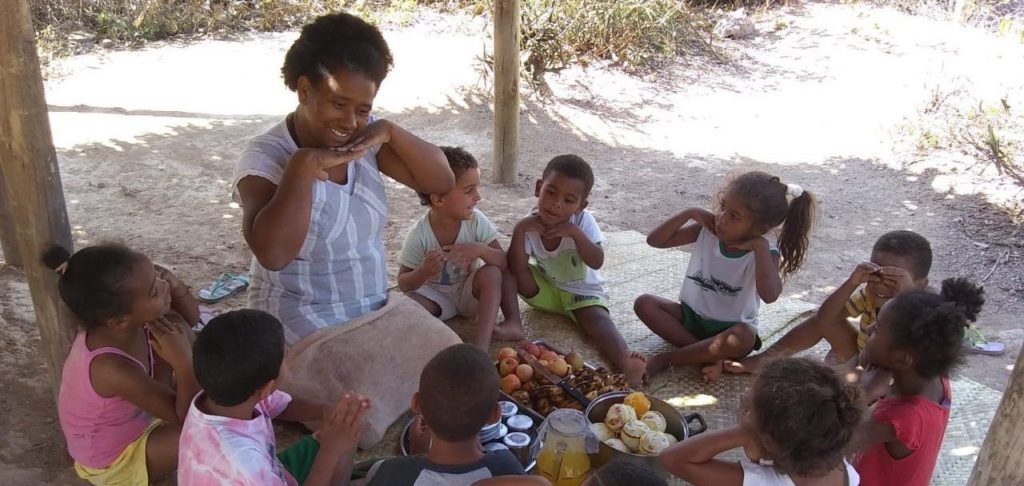The Waldorf Pedagogy
in public school
history – challenges – perspectives
by Rubens Salles and Rosineia Fonseca
Jundiaí SP
On the 17/06/2019 we were in Jundiaí visiting the EMEB Manoel Aníbal Marcondes, better known as Quintal do Aníbal, when we talked to the director Rita Rozeno and the coordinator Adriano Mastrorosa. In another visit on 08/7/2019 we interviewed educators, mothers and fathers of students. The daycare has 140 students, of which about 10% are children with special educational needs.
highlights
1 – All the initiatives to take Waldorf Pedagogy to public schools were the result of the work of a person or a cohesive group of people deeply dedicated to the cause of education, and who have already experienced the transformations that this pedagogy is able to bring about in the lives of children. children and their families. This case of Jundiaí is no exception to this rule. The transformation of this day care center into a school inspired by Waldorf Pedagogy began about ten years ago, when Rita Rozeno took over its direction and undertook this change. We present this history in your words below.
2 – The parents of the children from Quintal do Aníbal that we know would very much like their children to continue in early childhood education in a municipal school, which was also inspired by Waldorf Pedagogy. We consider that the municipality of Jundiaí has a consolidated experience in this day care center, which could be extended to other day care centers and kindergartens in the network, through courses and internships for teachers. It is easy to see the benefits that this initiative would bring to children, families, educators and the public network itself.
3 – As in the other initiatives we visited, at Quintal do Aníbal we met several educators who were passionate about their work inspired by Waldorf Pedagogy and several parents who were very involved with the school and happy with the development of their children. With each experience like this, we are convinced that Waldorf Pedagogy needs to be much better known and practiced in public schools.
Some basic data about the municipality of Jundiaí SP
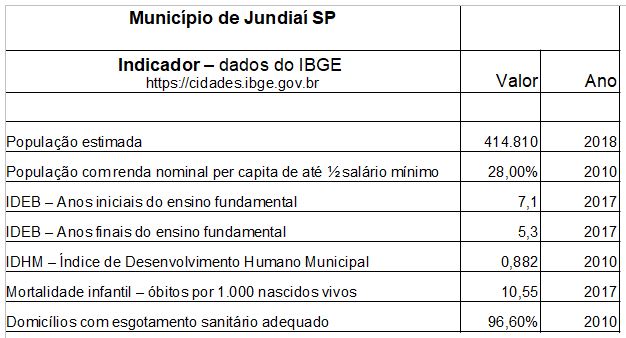
Address
Cell Street Motto of Fonseca 366 – downtown – Jundiaí SP
Phone 11 4521-6882
[email protected]
Facebook
People interviewed
Rita de Cássia Rozeno de Souza Castro – director
Adriano Mastrorosa – coordinator
educators
Maria Júlia César Vilhena – teacher
Samira Alves de Lima – teacher
Marli Aparecida Santos Bressan – teacher
Illênia Peixoto Negrin – teacher
Maria Lúcia Mayer – child development agent*
Raquel Teresa Vieira – child development agent
Paloma Aparecida Soares – child development agent
mothers and fathers
Cecília dos Santos Reis Araújo
Mariana de Oliveira
Natalia Biazotto Piccolo
Edson Passos Jr.
Christiano Ferreira dos Santos Basile
*Child Development Agents (ADI) are auxiliary educators who act as support for teachers in each class.
a story of transformation
Rita Rozeno – About ten, eleven years ago, I met Luiza Lameirão, from the Waldorf Pedagogy training seminar. I was a director and I was doing a graduate degree with her. She advised me to take a small school with young children. So, I asked for a transfer to this school with fifty students. Those were very difficult times. Here I found very segregated children, where the main tool of pedagogical education was physical restraint. It is believed that everyone needs to be taught as if everyone were one. That's why everyone has to stop, so that they look at the teacher.
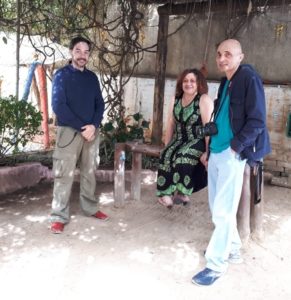
Adriano Mastrorosa, Rita Rozeno and Rubens Salles.
But we start from the assumption that individuals are unique and that it is not my role to stop everyone and listen to me. My role is to instigate their intelligence, encourage them to go out into the world to learn. Here there were containment gates on the doors of the rooms that were really supposed to contain. There was a television, the children were seated and I tried to work under these conditions. Luiza Lameirão guided me to look for Renate Keller at Monte Azul. So I went there and she was very kind to me. She opened the doors, showed me everything and said: “I'm going through the same issues as you, because it's not about you or the city, it's about how the country thinks about education. So, any space that intends to improve quality from the base, will be a space of resistance.” Renate offered me her Political Pedagogical Project (PPP). And he said that it would serve as an initial pedagogical proposal, because the pedagogical proposal is built by people.
Hence, we started to do training for social educators there. This leaving school, going to another space to learn, served many things, because in addition to studying, we started to live as people, outside the professional format and to create bonds. I started going after Marcos Ferreira at USP, after Renata Meireles, I went to UNESP. Where I thought there were people who could help, I went. Going out and listening to people was key. We also attended a lecture by José Pacheco, and we came back here with this desire to form a group, base the practice and react. People never said no to us. This also helped the group to realize that the inferiority complex was ours. It is true that we have a country that is quite difficult, but that has many people engaged in what we think, we were not alone. Renate used to say that we swim against the current, but only live fish swim against the current.
People followed. Initially, the people who were here not only believed that physically containing children was a pedagogical strategy, but they also understood that educating children involved violence, screaming, psychological coercion, these things were very ingrained. I also brought trainers into the school. I once heard one of the teachers participating in a training and saying, “I can't remember the last time I realized I had a body.” Then I came to understand that it was not just a vision of the world, but it had to do with their presence in the world, how they perceived themselves. They could not have alterity with the children because childhood was so far from their bodies, from their lives, that they did not reach what that was. A year and a half later, they started taking the television out of the room. The gates were coming out too. Then we went to map the school spaces so that the children could play in all spaces. And we call “space” every place that the child could experience with their body, regardless of being helped by an adult or not; to be free to create, to play. And we realized that almost 70% of the school was “no space”. We called “no space” any space in which the child could not do this. For example, the corridor is a place of passage and you have to pass in a specific way, quietly. And you can't ask that of a little boy. We had to dismantle these beliefs. People broke up the queues.
Then we met CENPEC in 2011. They were incredible partners. Pilar Tetilla educated us. She is a great schoolmate. We stayed with CENPEC for two years. We made a documentary, they took us to an event in São Paulo, there were several actions. And these actions that CENPEC took put us in a position to continue working without disappearing, because we achieved the prestige of the city and the parents.
We presented a final work in a course and Luíza Lameirão said that with little knowledge of Waldorf Pedagogy, we were realizing Rudolf Steiner's dream, which is to take Waldorf Pedagogy out of the walls and into the world. And I also went to the seminars once a month, I took the demands from here and I had forty minutes with her. She said to me like this: “I want you to stop writing and think that you are soaring, flying. I want you to look up from above and I want you to come down, put both feet on the ground and you will be everything you are saying school needs to be.” She gave back to me a responsibility that was to embody the school.
Teachers – the challenge of conducting processes that expand the human experience
We met several educators from the team, and both the teachers and other assistants showed to be very well integrated into the pedagogical proposal of the school and happy with the work they are doing. The school's atmosphere is very good, and is reflected in the children and in the recognition of the families, but it is the result of long-term work and constant breaking of paradigms.
Rita Rozeno – The demand for services is greater because we are working on the basis of something that is paradigmatic. The teacher arrives here and begins to realize that he is not a hard worker. He needs to think, reflect on what he's doing, otherwise he can't handle it. We are from a profession in which we do not understand our object of study, which is the child, people. First of all, we have to be an expert in people. The educational process is not greater than that individual who learns at that particular moment in life, perceives himself in a certain way at that particular moment in life. If I don't understand this, I'm doomed to fail. We have a conceptual background, very content-oriented, and we do not understand what “people” are. In a space where you need to manage processes that expand the human experience, how are you going to expand the human experience if we don't know anything about humans, starting from ourselves? That's the big challenge.
We share part of the teacher training with Angelim, the city's Waldorf school. When there is a course there, the teachers here go. The other part, I go to the training and bring the training here. The pedagogical proposal is very clear to everyone. It's hard to do, but everyone has a bond with the kids, respect, people don't yell at them. This delicacy with children is consolidated.
Maria Julia Cesar Vilhena - teacher
Julia – I got to know Waldorf Pedagogy in college (USP). In 2015 I did an internship here at Quintal and I was delighted with the school. I really liked the way of working. I have already worked in the private network and in the network of Itupeva. The community here is very different from the ones I found in other schools. We realize that the parents who are here are more attentive. It is very difficult to bring the family to school and here we can, here we have this, which I think is essential.
Watch the full interview
Marli Aparecida Santos Bressan - teacher
marly – I've been a teacher here at Manoel Aníbal for two years, but I've been an educator here at Quintal since 2009. I started as an ADI, went to study, graduated and came back as a teacher now. I have a long history of caring and loving this place here. I go back and forth, always. I went, stayed for a year, then went to another school and came back. I'm not effective at the school, but I hope to stay, because the proposal enchants me a lot, it always enchanted me. In fact, that's what made me graduate in education, it was me being in this place, because at first when I joined the network, I was more disenchanted than I was enchanted, in the formats it has. But when I arrived here, after the first strangeness, (because first there was a strangeness, because it was different from what I had seen) I was enchanted. I say that this is my home, that here I work happily. What makes me have this enchantment is that here we prioritize the child and the adult is educated to do the right thing, the right thing for the child.
Watch the full interview
Samira Alves de Lima – teacher
Samira – I've been a teacher here for six years. I came from Fundamentals. I have always been a literacy teacher. I was trained in a very strict school and on the other hand I became a very strict teacher too. I believed in the authoritarianism of the teacher and in this isolation, in this detachment from the child.[…] In the first six months I felt very lost. Then, it was adaptation with the age group, adaptation with the school and adaptation with this proposal that I didn't know until then, because I came from a very different school. Then we started to study, the school started to give a lot of training, we went to get some information and today, after six years I discovered that I knew very little of what I could have learned, but I've walked a lot. Understanding the child, all the complexity and interest he carries, is a daily task. Today I am very happy, very happy for my choice. I think school changed me more as a human being than I did in the lives of children. For me it has been a daily learning process and a constant paradigm shift.
Watch the full interview
Illênia Peixoto Negrin - teacher
illenia – I have studied the principles of Waldorf Pedagogy through the school here and I realize that, in fact, it was Waldorf Pedagogy that gave this public school a different direction. I realize that this guided the transformation of the educators who work here today, and who have been here for many years, because I am new at home, but the teachers who have been here for more years I realize that they managed to transform their practice through this perspective of the Waldorf Pedagogy. Today I also incorporate various elements of this pedagogy into my daily life with children. I realize how rich this is for the child, and how it actually puts the child in a leading role in his own childhood.
Watch the full interview
Child development agents – precious auxiliaries
The Child Development Agents are auxiliary educators who work to support the teachers.
Rita Rozeno – Among the Child Development Agents there is a group of women who were housewives. They came to work because of financial conditions. These people didn't know that we have a journey that is ours alone. Discovering this way of thinking wasn't just for the kids, it was for them too.
Some of them, arriving here, began to discover that there is someone inside them, who is individual and makes his/her history in the world. Your individuality. Before, everything was outside. These people have gained respect within the structure of the school, which has nothing to do with their position, it has to do with an achievement of who they are as people. They are very powerful people, who would easily fall into oblivion if they weren't in a place that gives them a voice. Those who help to maintain this school are these people, who have discovered that life is more than working, taking money and consuming. It is an honor to work with these people. They understand that what they come here to do is work for the education of young children. It has to do with an idea that Rudolf Steiner had back there and I don't know if he measured it, I have no idea if he had a dimension of it, that making an environment like that, the way he thought of the school, could reach the people to that degree, because when I started, I had no idea. And I started to see people sprouting, sprouting and becoming pillars. I am immensely proud to work with them!
Maria Lucia Mayer - child development agent
Maria Lucia – I've been here for ten years. I have more than thirty years of experience in Early Childhood Education, but Waldorf pedagogy, I got to know here. In Waldorf pedagogy, I fulfill myself as a person and as a professional. Here I fulfill myself because here I have the autonomy to create, I can do what I like. I have this autonomy to build a doll with the parents, to play with this doll with the child, I can create it together with the teachers. We really work as a team. Do you know the hierarchy? We don't feel it, because we work as a team.
Watch the full interview
Raquel Teresa Vieira - child development agent
Raquel – This group I'm with, I've been with since last year. We have already created a bond with the parents and we ended up building a relationship of trust. Many things that happen at home, they come to confide what the child said, and even when they do something wrong at home that is different from what we do here, they feel the freedom and confidence to tell us, without judgment. Parents learn a lot here at school. I'm a student's mother too, and I see from my experience as a mother, if I had my son at another school, at home I wouldn't be giving him the education I give him. Here parents learn much more to value Being a child.
Watch the full interview
Paloma Aparecida Soares - child development agent
Paloma – My relationship with the parents was always a good one, both in the previous school and in this one, but here there is a greater participation of the parents. Here we have a whole job, from management to us educators, so that parents participate in the school's proposal. We make parents believe that the school only transforms when everyone helps, when everyone understands that the school belongs to everyone. […] We start from the proposal that the daycare is a space where the child builds identity, where the child learns what the world is, where he discovers the world. So it is important for children to know from an early age that our world is made up of human beings that are equal in their humanity, but different in their diversity..
Living with parents
Rita Rozeno – I tell the girls: It's not about me or you. It's about the kids who have just arrived in the world and they still can't handle this world and we need them to understand right now that the world is a good place. And it will be for me, for us, for all of you that they will understand this. Educating parents is essential for this to happen. Take the tablets, take the cell phones and give life to children. Making parents want to be with their children is essential. I have a fundamental task, because the child needs a reference adult and sometimes this adult is here at school.
There are many parents who come here because friends had their children here or because they heard about the school. They already come to visit the school and they want this school, they go to the Secretariat and they expect this school. Sometimes they wait from 1 to 2 and a half years, but they want to put it in this school. I have a father who also arrives unaware. We receive several children, many of them on the autistic spectrum. Today, 10% at school are children with special needs, and some come here with stereotypes that are not typical of the spectrum, but are related to the relationship they had with people. Children are from 1 to 4 years old, and if the parents of children with special needs enter with an injunction and the child can stay here for another year.
Cecília dos Santos Reis Araújo - mother of students
Cecilia – If you stop to think about your need as a human being for contact with nature, and see that your child has the opportunity to experience this at school, even for a small part of the day, it's worth it. If you have a yard in your house, you will see that he will start to take advantage of that yard 100%. If you don't have it, you'll see that he won't have that need to stay on TV or cell phone anymore, or to stay locked up with manufactured toys. He's going to lose that need, and he's going to start to realize that being around his mom when she's cooking, when she's working, is fun too. He'll find fun in places you might not otherwise see.
Watch the full interview
Mariana de Oliveira - student's mother
Mariana – We talk a lot between parents, which is the cool thing about daycare. If we had the opportunity, we would extend it even longer (the period of children in this school) because the methodology that is used here at the daycare teaches the child to live. And it's not living confined with a cell phone, with TV, it's living in contact with the land and with things that we had in childhood and that today many children don't have. That part is pretty cool. So, for me, my son would have that until college, because we would create more human children, because today we are creating robots. We look at the children and they are only on their cell phones, and they are not in the habit of playing, connecting with the earth, connecting with nature.
Watch the full interview
Edson Passos Junior - student's father
Edson – It's great here! It is inexplicable! It's a world apart. It's amazing how there are no public pedagogical projects like this one everywhere. Should have more. When we become parents, we never come with an instruction manual. Lucky we found it here and from then on we became better parents, more engaged with the cause of education, because we saw that it works here. Diversity here is treated as a natural thing and we learn from them. It is a form of education that really sees the person.
Watch the full interview
Christiano Ferreira dos Santos Basile - student's father
Christian – My daughter calls the teacher a friend. "She is my friend!" So we see a lot of children and educators there in that environment, with a peaceful posture, a calm posture, and we know that it is not easy in an environment where children bring all their demands from the family environment, all their concerns . So we end up learning a lot, not only with her development, within an environment that has a more humanizing proposal, but we realize that the whole environment is constructive because it values this behavior. So we look at this and are always reflecting on our behavior on a day-to-day basis, at home.
Watch the full interview
Natalia Biazotto Piccolo - student's mother
Natalia – I had researched other schools and here I was delighted with the methodology. I even got to know other schools, but when they told me about this one and that it had the Waldorf concept, I was delighted. I came here, I met, I applied and it ended up working for her to enter, and it's passionate. It's much more than I expected. Here you see an affection that you don't see in other places, in other schools. If everyone had the opportunity to get to know a little bit and leave their child, I don't think they would want another type of concept, or type of school.
Watch the full interview

